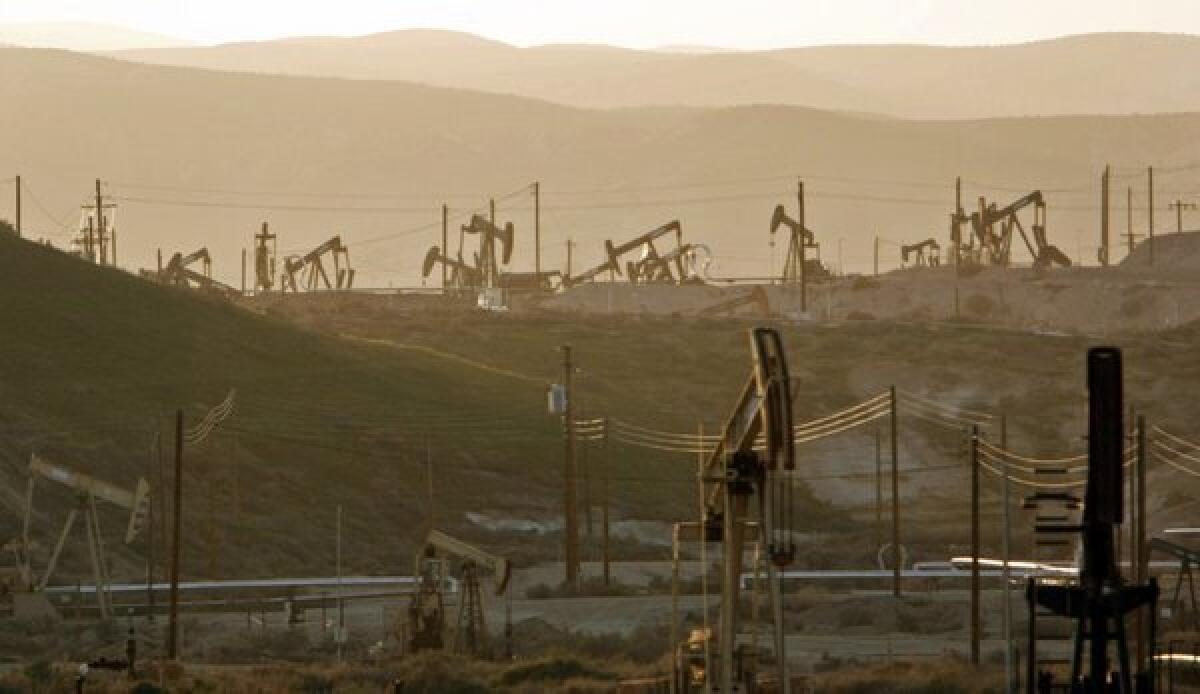A new effort to end California’s rip-off by oil producers

- Share via
For decades, the big mystery of the California tax system has been the state’s failure to exploit fully its greatest natural resource, oil. Of the 22 major oil-producing states, California is the only one that doesn’t charge a “severance” tax — that is, a levy on every barrel drillers take out of the ground.
Measures to impose a severance tax have gone to the ballot twice since 1981, defeated both times due to an onslaught of spending by the oil industry. A third effort has just been launched, this one directed at the Legislature. It’s time California fell in step with the rest of the oil-producing states.
The new effort is the brainchild of Tom Steyer, the San Francisco hedge-fund billionaire and progressive philanthropist who last year backed Proposition 39. That measure closed a corporate tax loophole that he estimated cost the state $1 billion a year.
The severance tax is a bigger target. Steyer estimates it’s worth as much as $2 billion in annual state revenues at current prices.
“This is about fairness in the relationship between the citizens of California and the oil companies that operate here,” he told me. “There’s no reason for the citizens to be taken advantage of anymore.”
How dumb is California to give up this revenue potential? Dumber than Texas and dumber than Alaska, to start. Steyer observes that Texas, the largest oil-producing state, charges producers 4.6% in tax and an additional 28% in royalties, totaling $14.40 a barrel. California’s oil levies, counting property and corporate income tax, come to $4.22 a barrel.
It’s even more embarrassing to be so far behind Alaska, where that paragon of anti-tax rhetoric, Sarah Palin, raised the severance tax to 25% while she was governor. Even Proposition 87 of 2006, California’s last effort at a severance tax, would have capped the tax at 6%. As we wrote in 2009, “even if it had passed, we’d still be suckers.”
California currently ranks fourth in oil production among the states, behind Texas, Alaska, and North Dakota. Curiously, however, the lack of an oil tax never seems to be on the agenda of the tax reformers who periodically blow through California. Meg Whitman, who made tax reform a central plank in her campaign for governor in 2010, never mentioned it. The Parsky Commission, which produced a hilariously convoluted “reform” of state corporate taxes for Gov. Arnold Schwarzenegger in 2009, never mentioned it.
But a severance tax has a unique virtue: it can’t be evaded. Unlike businesses that can pack up and move to other states, oil drillers can’t find California oil anywhere but in California. It’s not going anywhere.
Consequently, the oil industry attack on Prop 87 sounded a different theme, common to all campaigns against on the severance tax, which is that consumers would just end up paying it at the pump. That wasn’t true then, it wouldn’t be true today and it’s never been true.
The oil market is integrated on a global scale — producers and refiners can’t charge higher prices for the same grade of crude based on where they’re located because they’d be undercut by the world market. As long ago as 1982, the Rand Corp. made that determination for the state Assembly. It reported that for the grades to go into gasoline, “producers cannot shift any of their (tax) burden.” Things haven’t changed since then.
Moreover, Rand observed, because oil companies can deduct their state taxes on their federal tax returns, federal taxpayers in effect would be subsidizing California’s oil tax. For citizens grousing that we give too much to the federal government and get too little in return, that’s one way to redress the imbalance. Without a state severance tax, Californians are effectively subsidizing other states.
Steyer’s campaign will run under the banner of NextGen Climate Action, his political advocacy group. He’s starting with a campaign of public information, including roundtable discussions, social media programming and opinion polling, all aimed at reminding the Legislature that the oil industry is one sheep they haven’t sheared, and the time is right.
More to Read
Inside the business of entertainment
The Wide Shot brings you news, analysis and insights on everything from streaming wars to production — and what it all means for the future.
You may occasionally receive promotional content from the Los Angeles Times.











